- Dimples/Sittin' And Thinkin' (Fontana TF 471) May 1964
- I Can't Stand It/Midnight Train (Fontana TF 499) October 1964 (47)
- Every Little Bit Hurts/It Hurts me So (Fontana TF 530) January 1965 (41)
- Strong Love/This Hammer (Fontana TF 571) May 1965 (44)
- Keep On Running/High Time Baby (Fontana TF 632) November 1965 (1)
- Somebody Help Me/Stevie's Blues (Fontana TF 679) March 1966 (1)
- When I Come Home/Trampoline (Fontana TF 739) August 1966 (12)
- Gimme Some Lovin'/Blues In F (Fontana TF 762) October 1966 (2)
- I'm A Man/I Can't Get Enough Of It (Fontana TF 785) January 1967 (9)
- Time Seller/Don't Want You No More (Fontana TF 854) July 1967 (30)
- Mr Second Class/Sanity Inspector (United Artists UP 1203) December 1967 (35)
- After Tea/Moonshine (United Artists UP 2213) March 1968
- Short Change/Picture Of Heaven (United Artists UP 2226) December 1968
- Their First LP (Fontana TL 5242) July 1965 (6)
- The Second Album (Fontana TL 5295) January 1966 (3)
- Autumn '66 (Fontana TL 5359) September 1966 (4)
- With Their New Face On (United Artists ULP 1192) 1968
- She Put The Hurt On Me/I'm Getting Better/I'll Drown In My Own Tears/Goodbye Stevie (Fontana TE 17444) 1965
- Every Little Bit Hurts/It Hurts Me So/I Can't Stand It/Midnight Train (Fontana TE 17450) August 1965
- Sittin' And Thinkin'/Dimples/Searchin'/Jump Back (Fontana TE ) June 1966
The Spencer Davis Group
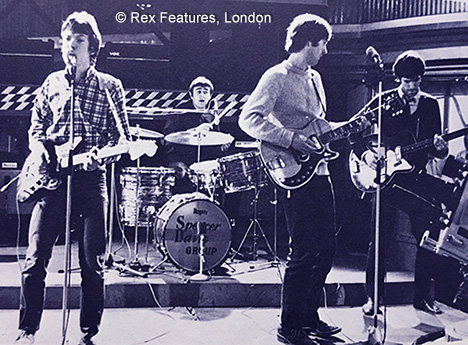
BIRMINGHAM
Updated January 2026
Spencer Davis (Davies) guitar, harmonica, vocal
Steve Winwood lead vocal, piano, organ, guitar (left 1967)
Mervyn "Muff" Winwood bass guitar, vocal (left 1967)
Pete York drums
Eddie Hardin organ, vocal (joined 1967)
Phil Sawyer lead guitar (joined 1967 - left 1968)
Ray Fenwick lead guitar, vocal (joined 1968)
Dee (David) Murray bass guitar, vocal (joined 1968)
Nigel Olsson drums, vocal (joined 1968)
One of the most exciting and influential groups to come out of Birmingham in the early 1960s, the Spencer Davis Group is recognized for their classic and ground-breaking recordings as well as for launching Steve Winwood's music career.
"My mouth fell open and I felt a chill down my spine! That was the night I discovered Rhythm and Blues for the first time"

Spencer Davies was born on July 17, 1941 in Swansea, South Wales. He moved to London as a teenager where he played in skiffle bands for a year and became heavily influenced by imported American blues music.
In 1960, Spencer Davis relocated to Birmingham and studied languages at Birmingham University before working as a teacher at Whittington Oval Junior School in Yardley. In the evenings, he would play his 12 string guitar and sing traditional blues songs at various venues in the city and for a short time formed a duo with future Fleetwood Mac member Christine Perfect (see Chicken Shack).
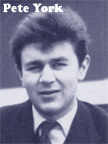
Accomplished jazz drummer Pete York (born August 15, 1942 in Middlesborough) met Spencer Davis while playing at the "University Rhythm Club". Pete was already part of the Birmingham live jazz music scene performing with the university jazz band under Harry Beaufort, winning the National Jazz Band Competition in 1963 led by Eddie Matthews. By day, Pete was employed at the GKN (Guest, Keen & Nettlefolds) screw factory. "I learned everything there about screws and screwing!" he said.


Steve Winwood was born on May 12, 1948 at 127 Church Lane, Handsworth and lived with his family at a house on Atlantic Road in Old Oscott near Erdington. He learned to play piano at an early age and sang in the church choir along with older brother Muff (Mervyn) Winwood (born June 15, 1943).
The brothers both learned to play guitar with the initial interest being jazz as was popular at that time. The boys' father played saxophone in a local dance band and would sometimes invite the brothers up on stage to perform some jazz or rock 'n' roll numbers.
Muff Winwood remembered; "We were both playing guitars so my father said; 'Why don't you play the rock 'n' roll medley with our band?' We'd stand up and play three or four rock numbers in the set and it went down a storm. Steve was wearing his short trousers!
In 1959 while still at school, the Winwood brothers had their first group called "Johnny Star and The Planets" with Steve on guitar, Muff on the drums and his class mate Dave Palmer on the bass guitar. This line-up lasted for about four months. Dave Palmer then joined 'Johnny King and The Diamonds' and later 'Shades of Blue'.
Steve Winwood recalled; "When I was 13, I'd get the bus to music college in Birmingham, but within a year I was kicked out. The Head called me in and asked what kind of music I liked. I said 'Paul Hindemith and Igor Stravinsky, Fats Domino and Ray Charles'. He said 'You've either got to forget about the last two or leave this establishment'. So I left. The world was just a different place back then, as anyone who grew up in the 1950s will remember."

Spencer Davis played solo guitar spots at the "Golden Eagle" pub on Hill Street in Birmingham - at that time a hangout for many of the city's rhythm and blues enthusiasts. In early 1963, he met the Winwood brothers performing as the "Muff-Woody Jazz Band" at a pub in Erdington.
Steve Winwood was aged 14 at the time but he posessed a vocal style that was way beyond his years and was also talented as an instrumentalist and alternated between guitar and piano on stage. Finding common musical ground, Spencer asked the brothers to join him along with drummer Pete York. Spencer's new line-up became known as "The Rhythm and Blues Quartette".
With the addition of the Winwood brothers, young Stevie became something of a 'secret weapon' when unveiled to an unsuspecting audience and word spread quickly about this amazing young vocalist. Spencer Davis said; "I presented the group to the Golden Eagle Club. Within two weeks we had lines around the block."
"I presented the group to the Golden Eagle Club. Within two weeks we had lines around the block."
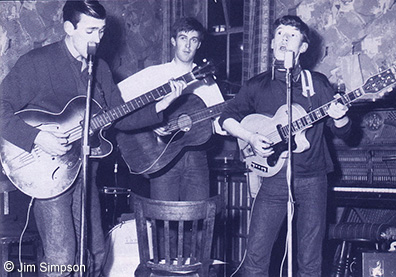
A regular visitor to the Golden Eagle R&B on Monday nights was future Slade star Noddy Holder whose reaction to the group is worth quoting; "Of all the bands I saw in those days, they were the ones who impressed me the most. They had this small public address system, one of the smallest I had seen and were very unassuming on stage, and then this spotty kid on the organ suddenly opened his mouth and screamed "I LOVE THE WAY SHE WALKS..." and launched into an old John Lee Hooker number. Gosh - my mouth fell open and I felt a chill down my spine! That was the night I discovered Rhythm and Blues for the first time."

A young London music promoter named Chris Blackwell had just founded the Island Records Company while running a record import business specializing in ska and reggae music from the West Indies. His first signing was 15 year old Jamaican singer Millie Small and after having huge success with her hit single 'My Boy Lollipop', Blackwell decided to travel north in search of new talent. Upon arriving in Birmingham, and initially intending to check-out Carl Wayne and The Vikings, he was advised to go and see the Rythm and Blues Quartette which he did and was immediately impressed.

The Quartette had first attracted the attention of the Decca Records label for which the group went to London for a try-out recording session. Decca offered a contract but Blackwell promised them a better deal with the Phillips owned Fontana label as distributor so they signed with Fontana along with a publishing deal at Island Records. The partnership at Island Records was an informal one based on little more than a handshake but this indiscretion would come back to haunt them years later.
It was Muff Winwood who came up with the name "Spencer Davis Group" on the pretext that the articulate Davis could do the interviews while the others stayed in bed. The first single release by the group in April 1964 was a cover of the John Lee Hooker song 'Dimples' as it was considered one of the strongest numbers they performed in their set at the time.
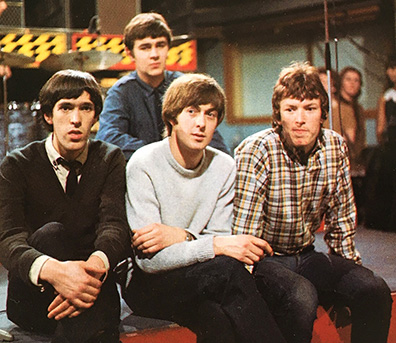
Unfortunately, the original John Lee Hooker version of Dimples was issued in Britain at about the same time and became a hit thus overshadowing the Spencer Davis Group's version. The record did sell well around the West Midlands where the band had a large following.
The Spencer Davis Group took on a heavy schedule of bookings across the country and possibly because of this exposure their next three single releases 'I Can't Stand It', 'Every Little Bit Hurts' and 'Strong Love' did manage to gain chart placings. The group performed in the British film "Pop Gear" hosted by Jimmy Savile and which also featured The Beatles and fellow Brum band The Rockin' Berries along with many other up-and-coming pop groups of that time.
Muff Winwood remembered; "In those days they still had cheap bed & breakfast places for show business people. When we went up to northern clubs in Manchester, Newcastle, or Leeds, there was amazing digs in old 'Coronation Street' type terraced housing. There'd be eight people to a room with bunk beds. Dinner was served until three o'clock in the morning when people got back from work. You'd sit around the table with chorus girls and comedians and occasionally other bands. The woman and her husband would serve this ridiculous food - lashings of spuds, bacon and beans.".

It was Steve Winwood who handled the lead vocal on the A-sides of the group's singles. His vocal range and tasteful piano playing was truly amazing as demonstrated by soulful records like 'Every Little Bit Hurts' in contrast with their more up-beat numbers. Only a few songs such as 'She Put The Hurt On Me' had Spencer Davis in the vocal spotlight. There was little doubt that Stevie was the focal point of the band and therefore their main attraction.
Up to this time, the songs performed and recorded by the Spencer Davis Group were covers of existing blues and R&B standards but Chris Blackwell brought in Jamaican singer/songwriter Jackie Edwards to compose the next three singles for the group. The first was 'Keep On Running' which was transformed by the group into a rocking R&B number with the addition of a driving bass riff and a unique (for that time) electric fuzz guitar effect. The result it had on the record charts was spectacular with the song knocking The Beatles off the top spot and going to Number One before the end of 1965.

Muff Winwood said; "Somebody from America bought me a fuzzbox called 'The Big Muff' because of my name! so we tried it on the record to get that sound on the opening riff". The Spencer Davis Group's first LP was soon recorded and rushed into the shops along with a hectic schedule of radio and TV appearances that followed. The band members now had to endure their new-found pop star status of being pursued by gangs of screaming girls!
Success is inevitably followed by criticism. Some of the Spencer Davis Group's early supporters accused the band of "selling out" or spending more effort getting hit records than they did on playing a good blues performance but from the loads of new fans who bought their records there were certainly no complaints.

It's interesting to note that Dave Mason, formerly guitarist in a Worcester beat group called The Hellions was employed by Spencer Davis as a part time road manager. Dave soon struck up a friendship with Steve Winwood.
Upon touring Europe, the group found themselves popular - particularly in Germany where Spencers' fluent use of the language endeared them to the audiences. The follow-up single 'Somebody Help Me', also composed by Jackie Edwards, gained another Number 1 position and another Jackie Edwards/Steve Winwood composition released as the group's next A-side, 'When I Come Home', made it to the Number 12 spot.
During 1966 the Spencer Davis Group group starred in the pop music comedy film "The Ghost Goes Gear" and had recorded their third album issued on the Fontana label before the end of that year.
"Steve had been singing 'gimme some loving' and just yelling out anything. We fitted it all together and by about twelve o'clock we had the whole song."

For the next single release the group was pressured by Chris Blackwell to compose their own material. He booked them into London's Marquee Club rehearsal room in Wardour Street and told them to come up with something.
Muff Winwood recalled; "It was eleven o'clock in the morning and we started to mess about with riffs. We hadn't been there for more than half an hour and this idea just came. Steve had been singing 'gimme some loving' and just yelling out anything. We fitted it all together and by about twelve o'clock we had the whole song."
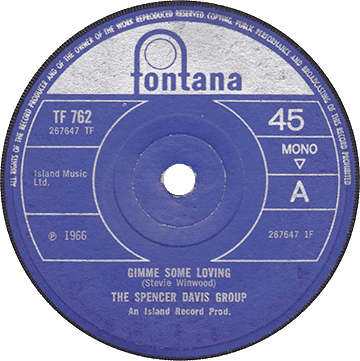
Pleased with themselves, the group went to a nearby cafe for a break only to be interrupted a short time later by a furious Chris Blackwell who had dropped by the rehearsal room to see how it was going, only to find their equipment set up and nobody there. Muff said; "We told him 'Don't worry' and then went back and played Gimme Some Loving and he couldn't believe it! We recorded it the next day."
Driven by Steve Winwood's Hammond organ along with Muff's powerful bass riff, the high-energy 'Gimme Some Lovin' became an instant classic - reaching Number 2 in the British charts and going on to make Top Ten in America. To this day it remains a staple of many party compilations and is probably the most instantly recognizable song by the group. Jimmy Miller later re-mixed the record to include extra percussion, piano and vocal backing before it was issued as a single in the USA.

Steve Winwood's growing confidence as performer and songwriter was leading to his dissatisfaction within the group and he began to hang out with other musicians, particularly Dave Mason and Jim Capaldi who was in a Midlands group called Deep Feeling and Chris Wood from the Birmingham band Locomotive.
By 1967, it was clear to most that the young Steve Winwood was outgrowing the Spencer Davis Group and encouraged by Chris Blackwell, he made known his intention to leave after the groups' current tour commitments had been fulfilled.
Muff Winwood said; "We'd already decided to quit. Steve wanted to get involved in the whole psychedelic thing. There were big changes happening lifestyle-wise. I said to him 'If you wanna go, I'll go too'. We both fixed a date and it wasn't acrimonious in that sense. We decided to promote 'I'm A Man' and then quit. I've got the date in my old Melody Maker diary - April 7, 1967. That was the last gig of a package tour with The Hollies."
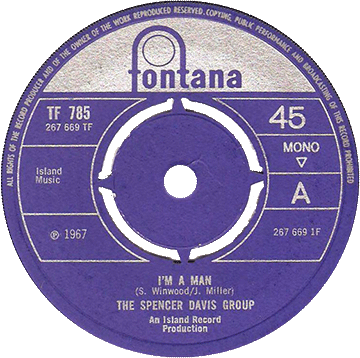
An excellent Spencer Davis Group single titled 'I'm A Man' (chart position 9), composed by Steve Winwood and producer Jimmy Miller, was issued in early 1967. It was the final record with Steve and Muff Winwood who had accepted a job offer from Chris Blackwell to work at the Island Records office.
By this time, Steve Winwood had been rehearsing for a few months at the "Elbow Room" club in Birmingham with Dave Mason, Jim Capaldi and Chris Wood. Their new group to be named "Traffic" would shortly be signed to Island Records by Chris Blackwell (see Traffic for more about Steve Winwood).
During the summer of 1967, Spencer Davis put together a new Spencer Davis Group line-up. Following extensive auditions and much consideration, keyboard whiz kid Eddie Hardin and guitarist Phil Sawyer were selected.
Eddie Hardin recalled; "My family knew Paul Jones of Manfred Mann who was touring with Spencer at the time Steve was leaving. Paul recommended me to Spencer who came round to see me. I played a bit and that was that!" One of the rejected applicants was a young piano player named Reginald Dwight who would later launch his own career after re-naming himself "Elton John".

The 'new' Spencer Davis Group appeared in and performed songs for the comedy/drama film Here We Go Round The Mulberry Bush starring a young Barry Evans who went on to find television fame with "Doctor in the House". Steve Winwood's Traffic also contributed music for the film including the title track.
The first Spencer Davis Group single to be issued without Steve Winwood in the line-up was 'Time Seller' composed by Spencer Davis and Eddie Hardin that reached Number 30 in August 1967. This record was quite innovative and progressive sounding for the time with a heavy cello backing and seemed to indicate a new and promising musical direction for the group.
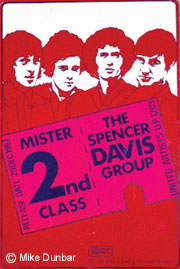
Phil Sawyer left the band at the end of the year and was replaced by Ray Fenwick who joined in time to appear on the next single 'Mr Second Class' that only got to Number 35 in the record chart. A new Spencer Davis Group album titled "With Their New Face On" was also released in early 1968 and although it was a strong collection of songs it was overshadowed by the publicity surrounding Traffic's debut album.
"Steve was off having fun with his new mates and everybody was telling Spencer and I we were finished"
With the departure of Steve Winwood the magic seemed to have gone. Another Spencer Davis Group single issued in March 1968 and composed by Ray Fenwick titled 'After Tea' sounded like an attempt to duplicate Traffic's sound but it failed to chart.
Pete York said; "With the departure of Muff and Steve we lost some of the blues and jazz feeling, and psychedelic music was emerging around us. I didn't mind any of that, I just played what I felt fitted or helped. There was a lot of resentment and disappointment after the break-up. Much like a marriage going wrong. Steve was off having fun with his new mates and everybody was telling Spencer and I we were finished. Not a good time."
In October of 1968 Eddie Hardin and Pete York left to form the critically-acclaimed and successful duo "Hardin and York". They were replaced by Dee Murray and Nigel Olsson respectively (who both later joined Elton John's band) but after a final single and a cancelled album, Spencer Davis disbanded the group.
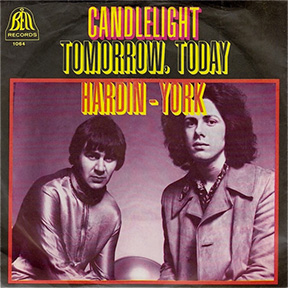
Davis initially re-located to Germany and later moved to the USA but the Spencer Davis Group's last stab at fame came about unusually when the adopted theme song for ITV's popular childrens TV show "Magpie" turned out to have been recorded by the late 60s line-up of the Spencer Davis Group under a pseudonym "The Murgatroyd Band".
Muff Winwood who left the group at the same time as Steve, had taken a job offer from Chris Blackwell to work for Island Records as sales and promotion agent. He worked for Island until 1978 when he accepted a job as senior executive at Sony Records. In this capacity, he played a major role in the launching of some of the biggest British music stars of the 1980s and 90s.
Pete York moved to Germany where he lives today and continues to play drums which involved occasional touring and recording with his long-time friend Eddie Hardin. Pete has also appeared on recordings and on stage with many famous names in music from the 1960s and 1970s.
During the 1980s, Pete York hosted his own influential television show called "Super Drumming" that ran for three seasons in Germany and is still the first and only TV show on a national channel dedicated to drumming and the percussive arts. Pete remains a highly respected drummer and has his own terrific website at: www.peteyork.com
To see an exclusive BrumBeat interview with Pete York, click HERE
The 1980s also saw the re-union of the original Spencer Davis Group line-up in a courtroom setting with the former members suing the Island Records company for un-paid royalties (none of them had been paid for recordings made prior to 1968). A settlement was eventually reached after a costly legal battle.

Spencer Davis continued to record and play music in the 1970s and 80s which included a short-lived Spencer Davis Group reunion (without the Winwood brothers) in 1973. He relocated to the American west coast and has performed and toured with various line-ups of The Spencer Davis Group in both the USA and Europe. He passed away on October 19, 2020 while under treatment for pneumonia at age 81.
Spencer Davis remained a highly-respected musician whose legacy in rock music history should not be underestimated. "Stevie never sounded so good with Traffic, Blind Faith, or Airforce as he did with us." he sometimes said, and with some justification.
To see the BrumBeat Spencer Davis tribute, click HERE.
Sources: 'The Harmony Illustrated Encyclopedia of Rock' book 1982; 'Where Did You Go My Lovely' book by Fred Dellar 1983; 'The Guinness Book of British Hit Singles' book 5th edition 1985; 'Back In The High Life - a biography of Steve Winwood' book by Alan Clayson 1988; 'Eight Gigs a Week' CD book by John Reed 1996; 'Record Collector Magazine' February 1996; and 'Midland Beat' various issues. I'm also grateful to Pete York who provided much additional information.
Copyright © John R Woodhouse
The Spencer Davis Group 1960s Record Releases
(highest UK chart position in brackets)
Singles:
Albums:
Extended Players:
Some official Spencer Davis Group related websites are listed below:
Pete York: www.peteyork.com
Spencer Davis: www.spencer-davis-group.com
Steve Winwood: www.stevewinwood.com
If you would like to contribute to this page, please e-mail john@brumbeat.net